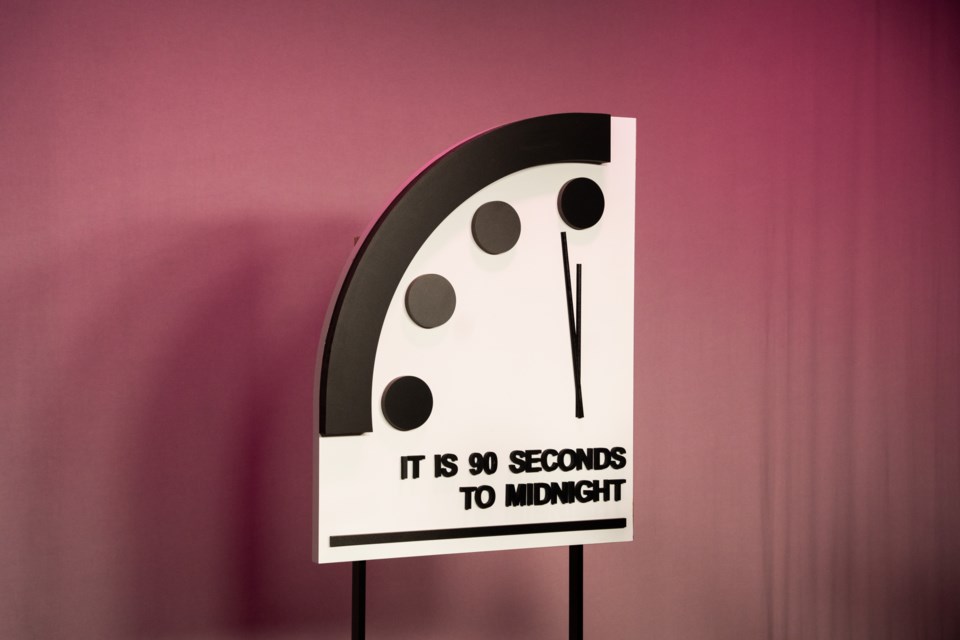My long-term readers know that every year around this time I turn towards the Doomsday Clock to check on the planet's "temperature".
In case you missed it, the Doomsday Clock "is a design that warns the public about how close we are to destroying our world with dangerous technologies of our own making. It is a metaphor, a reminder of the perils we must address if we are to survive on the planet," explains the Bulletin of the Atomic Scientists.
The clock was created in 1947, when nuclear weapons became the greatest threat to humanity, which was made even worse by the beginning arms race between the U.S. and the U.S.S.R. It remained the greatest threat for decades until climate change was put into consideration in the mid-2000s for the hand-setting deliberations.
Anyway, for close to 80 years, scientists and experts within and outside governments in many parts of the world have been analyzing the main global issues, and every January they would decide "what time" the Doomsday Clock should be set at.
This year the hands of this symbolic, but yet useful in recollecting the year, clock were left unchanged – at 90 seconds to midnight – which is the position it was moved to last year, the closest it has ever been to the symbolic world end, reflecting the continued state of unprecedented danger that we face.
I definitely didn't expect the Clock to be moved backwards this year. (It's possible, but would take way more action on behalf of the governments and people, and that action is urgent). Between wars, multi-dimensional nuclear threats and deterioration of the nuclear arms reduction agreement; a lack of progress being achieved in the sense of the climate crisis; record-high global temperatures in 2023; bio-threats; and a lack of regulations over dramatically advancing generative artificial intelligence, sometimes compared to nuclear weapons in the sense of its dangers, there definitely were no signs of stability last year.
Contrariwise, I was concerned the Oct. 7 Hamas attack, and the following Israeli-Palestinian war could push the Clock hands even closer to Doomsday. Ongoing talks about the Gaza conflict or the Russian-Ukrainian war or tensions between China and the U.S. potentially growing into (or already being the beginning of) the Third World War weren't mind-settling either. (To be fair though, talks about the Third World War have existed since the middle of the second one.)
Besides, throughout the year we've been exposed to so much news about natural catastrophes, tragedies and just some bad things stemming from all over the globe (not that nothing good happens, but we naturally tend to pay much more attention to anything alarming). It sometimes feels the world is already at hell's doorway.
So in that sense, the Doomsday Clock summarizes what we've been up to throughout the past year, where we're at, and how much more we need to do to actually destroy everything we have.
Apparently, we are not there yet. But the world is sure, not stable.
Talks about humanity being doomed, much like the discussions about the potential for the Third World War, are more irritating than worrisome or scary. Until they suddenly may become indeed real.
Some scientists suggested that there were global wars that could have been considered the First World Wars way before 1914-1918, and the later one during those and following years was mainly known as the Great War. However, after it was over, the analysis of the scale of the war, its industrial character, the level of destruction and also the aftermath resulted in the summary – it was indeed the First World War, something new and scary. But soldiers and people living during those times didn't view it as such until later.
Similarly, we might not know that the ongoing conflicts are already a part of something bigger that the future historians will call the Third World War. But the Clock stewards warn once again that a lot needs to be done and done fast to ensure we don't make it "there".
Gov. Jerry Brown, executive chair of the Bulletin said, "Only the big powers like China, America and Russia can pull us back", noting that despite deep antagonisms, the big players must co-operate to change things over.
Unfortunately, so far it seems that changing things for the better is not on these three's agendas, and it doesn't look like 2024 will bring any relief.






